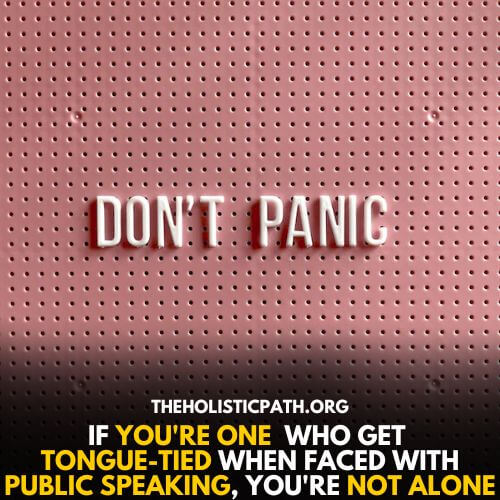Anxiety is a normal emotion that everyone experiences from time to time. However, for some people, anxiety can be more severe and persistent, leading to anxiety disorders. Anxiety disorders are the most common type of mental illness, and they can have a significant impact on a person’s quality of life.
One of the less well-known symptoms of anxiety is anxiety tongue or glossophobia. Glossophobia is the fear of speaking in public, and it can lead to avoidance of social situations, difficulty at work, and problems with personal relationships. If you suffer from anxiety tongue, read on.
What Is Anxiety Tongue
You may have heard of anxiety attacks, but did you know that anxiety can also manifest in your tongue? Anxiety tongue is a condition where the muscles in your tongue feel tight and constricted, making it difficult to move or speak.
While the cause of anxiety tongue is not fully understood, it is believed to be linked to stress and anxiety. Anxiety tongue is more likely to occur in people who already suffer from anxiety disorders, but it can also affect people who are generally anxious or stressed.
Why Anxiety Swells The Tongue
Have you ever had the feeling that your tongue is so big it’s swelling up inside your mouth? This sensation is often caused by anxiety or glossophobia – the fear of public speaking. When we’re anxious, our bodies go into “fight or flight” mode and release stress hormones like adrenaline.
This can cause physical symptoms like a racing heart, sweating, and shallow breathing. It can also cause the blood vessels in our tongue to dilate, making it feel larger than usual.
So if you’re feeling tongue-tied before a big presentation, don’t worry – it’s just your body’s way of preparing you for action!
10 Signs Of Anxiety Tongue
When we worry, our bodies often react in physical ways. Our hearts may race, our stomachs may churn, and we may start to perspire. These physical reactions are all common signs of anxiety. Anxiety can also affect the mouth and tongue.

Here are 10 signs to look out for:
- A dry mouth: When we’re anxious, we may produce less saliva, leading to a feeling of dryness in the mouth. This can make it difficult to speak or swallow.
- Bad breath: Anxiety can cause us to take shallow breaths, which can lead to bad breath. Additionally, dry mouth can also contribute to bad breath by allowing bacteria to thrive.
- Sore throat: Anxiety can cause us to tighten the muscles in our throat, leading to a feeling of soreness. Swallowing may also become difficult.
- Clenched jaw: Stress and tension can cause us to clench our teeth, which can lead to pain in the jaw and face. Additionally, clenching can also cause headaches.
- TMJ disorder: TMJ stands for temporomandibular joint disorder. This is a condition that causes pain and dysfunction in the joints that connect the lower jaw to the skull. TMJ disorder is often caused by stress and anxiety.
- Ulcers: Anxiety can weaken the immune system, which can lead to the development of ulcers in the mouth or on the tongue. Ulcers are painful sores that are slow to heal.
- Cold sores: Cold sores are usually caused by a virus, but they can also be triggered by stress and anxiety. Cold sores typically appear as blisters on the lips or around the mouth. They can be painful and often last for several days or weeks before healing completely.
- Burning mouth syndrome: This is a condition characterized by a burning sensation in the mouth that has no known cause. The exact reason why stress and anxiety may trigger this condition is unknown, but it is believed that they play a role in its development.
- Dry eyes: Anxiety can cause us to blink less often, which can lead to dry eyes. Additionally, when we’re anxious, our tear ducts may produce fewer tears, further exacerbating dryness.
- Swollen glands: Stress and anxiety can cause our glands to swell, leading to a feeling of lumpiness under the chin or jaw. Swollen glands are usually nothing to worry about, but if they persist for more than two weeks, it’s best to see a doctor.
These are just some of the ways that anxiety can affect the mouth and tongue. If you’re experiencing any of these symptoms, it’s important to see a doctor or mental health professional for help.
5 Causes Of Anxiety Tongue
There’s no doubt that we’re living in anxious times. Many of us are juggling work, family, and financial responsibilities, and it can be tough to cope. Here are five reasons why we may be suffering from anxiety tongue:
- We’re constantly bombarded with bad news. Whether it’s the latest mass shooting or the looming threat of nuclear war, it’s easy to get caught up in a cycle of fear and worry.
- We’re increasingly disconnected from each other. With more and more of us living alone or working remotely, it’s easy to feel isolated and alone.
- We’re under constant stress. From work deadlines to family obligations, it can feel like there’s no let-up in the pressure we’re under. We are under constant pressure to perform well at work or school, which can lead to worries about failure or success.
- We’re not getting enough sleep. With our busy lifestyles, it’s hard to get the recommended seven to eight hours of sleep a night, which can leave us feeling irritable and on edge.
- We’re not taking care of ourselves. When we’re stressed, it’s easy to neglect our physical health, which can further contribute to feelings of anxiety and unease.
If you’re feeling anxious, don’t hesitate to reach out for help. There are many resources available to support you through tough times.
10 Ways To Treat Anxiety Tongue Or Glossophobia
If you’re one of the millions of people who get tongue-tied when faced with public speaking, you’re not alone. In fact, anxiety about public speaking is one of the most common fears. While there’s no magic cure for stage fright, there are a number of things you can do to ease your anxiety and make your next presentation a breeze.

Here are 10 tips for dealing with glossophobia:
- Understand your fear. What is it about public speaking that makes you anxious? Is it the fear of being judged? The fear of forgetting what you’re going to say? The fear of making a fool of yourself? Once you know what’s driving your fear, you can start to address it.
- Face your fears. If you’re afraid of public speaking, the best way to conquer your fears is to do it more often. The more you do it, the easier it will become and the more confident you will feel.
- Prepare, prepare, prepare. A big part of public speaking anxiety is the feeling that you’re not prepared. Make sure you are by thoroughly researching your topic and practicing your presentation several times before delivery day.
- Know your audience. It’s important to know who you’ll be speaking to and what their needs and expectations are. This will help you tailor your presentation and make it more relatable to your audience.
- Put yourself in their shoes. Trying to empathize with your audience can also help ease anxiety by giving you a better understanding of their perspective. For example, if you’re giving a presentation to a group of students, try to remember how intimidating it was to sit in the audience when you were in school.
- Use positive visualization. Picturing yourself delivering a flawless presentation can help increase your confidence and ease performance anxiety on delivery day. Just close your eyes and imagine yourself nailing every point and getting a standing ovation at the end.
- Deep breathing. One of the physical symptoms of anxiety is shallow breathing, so taking some time to focus on deep, deliberate breaths can help calm nerves.
- Use affirmations throughout the day, and repeat positive statements to yourself such as “I am confident” or “I can do this .”
- Take care of your body be sure to eat healthy meals, exercise regularly, and get plenty of sleep in the days leading up to your presentation.
- Connect with other people who understand. If you know other people who get anxious when they speak in front of groups, reaching out to them for support can be incredibly helpful. These connections can provide empathy motivation and valuable advice that only comes from those who have been there before.
There is no one – size – fits – all solution to glossophobia. But by trying out different coping mechanisms, you’re sure to find a few that work well for you and help you give your best presentation.
Home Remedies For Anxiety Tongue
There are actually a few different home remedies that can help to treat anxiety tongue. One of the most effective is to simply take a glass of warm water and add a teaspoon of honey to it. Honey has natural soothing properties that can help to calm the nerves and ease anxiety.

Another home remedy is to mix together equal parts of lavender oil and water, and then use this mixture to gargle for a minute or two. Lavender also has calming properties that can help to ease anxiety. Finally, try drinking chamomile tea before bedtime as this can also help to soothe the nerves and promote relaxation.
Can Anxiety Cause Other Health Problems
Anxiety is a mental health disorder that can cause a variety of physical symptoms. These include:
- Increased heart rate
- Chest pain
- Difficulty breathing
- Dizziness or lightheadedness
- Trembling or shaking
- Sweating
- Headache
- Fatigue
- Stomach upset or nausea
These symptoms can vary in intensity and may come and go. They can also be accompanied by mental symptoms such as:
- Racing thoughts
- Feeling overwhelmed or out of control
- Difficulty focusing or concentrating
- Irritability
- Restlessness
Anxiety disorders are treatable, and there are many effective treatments available. If you are experiencing any of the above symptoms, please see a doctor or mental health professional to get help.
How Can You Live A Normal Life With Anxiety
If you suffer from anxiety, you’re not alone. In fact, anxiety is one of the most common mental health conditions. Even if you don’t have a diagnosable anxiety disorder, you may still experience anxiety symptoms on a regular basis. And if you do have an anxiety disorder, it can be tough to manage your condition and live a normal life.
So how can you live a normal life with anxiety? Here are a few tips:
- Talk to your doctor: If anxiety is impacting your daily life, it’s important to talk to your doctor. They can help you diagnose your condition and develop a treatment plan.
- Avoid triggers: Once you know what triggers your anxiety, try to avoid these triggers as much as possible. This may mean avoiding certain people, places, or situations.
- Practice relaxation techniques: Relaxation techniques such as deep breathing or yoga can help to reduce anxiety symptoms. Practicing these techniques on a regular basis can help you better manage your anxiety.
- Exercise: Exercise has been shown to reduce anxiety symptoms. A moderate amount of exercise is the key – too much exercise can actually increase anxiety levels.
- Get enough sleep: Sleep is essential for overall health and well-being. If you’re not getting enough sleep, it can aggravate anxiety symptoms. aim for 7-8 hours of sleep per night.
Anxiety can be a difficult condition to live with, but there are ways to manage it and live a normal life. If anxiety is impacting your life, talk to your doctor and make lifestyle changes such as avoiding triggers, practicing relaxation techniques, exercising, and getting enough sleep. These changes can help you better manage your anxiety and live a normal life despite your condition.
Conclusion
There’s no need to worry if you find yourself occasionally tongue-tied. We all get anxiety tongue from time to time. It’s nothing to be embarrassed about and it’s nothing to worry about. Just relax and take a deep breath. You’ll be fine.
